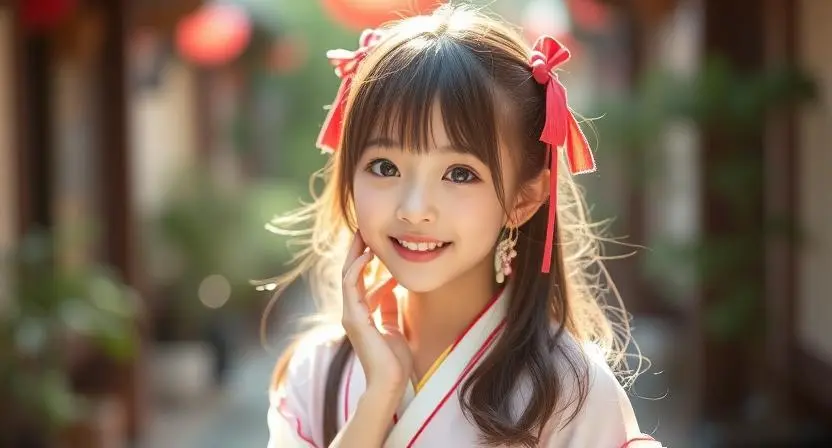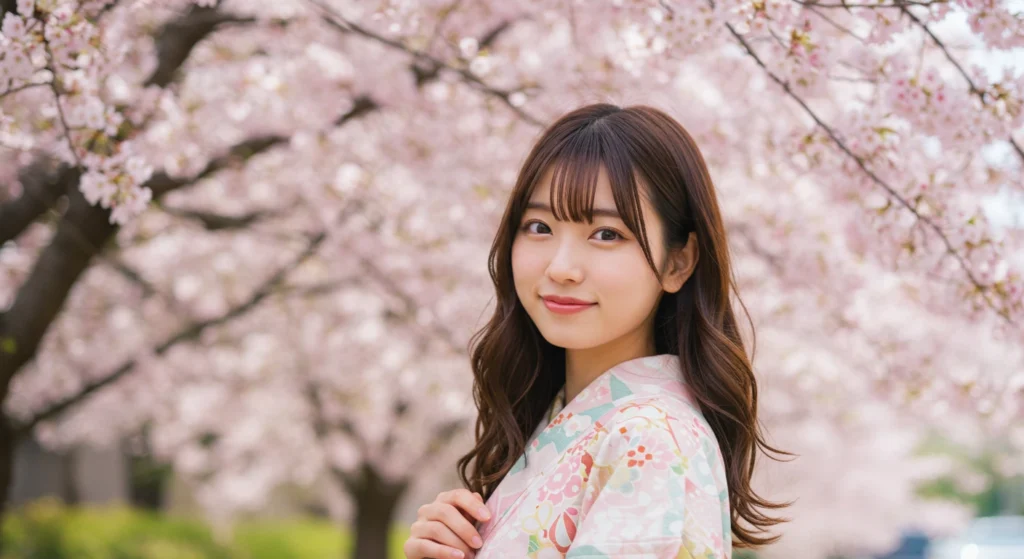Japanese names are more than just identifiers—they carry deep meanings and cultural significance and often reflect the beauty of nature, virtues, and traditions. Unlike many Western names, which may focus primarily on sound or family heritage, Japanese names are often chosen for their symbolic meanings, written in kanji characters with unique significance.
Depending on the kanji used, a single name can evoke images of cherry blossoms, moonlight, or strength and resilience. Some names express kindness and grace, while others embody power and wisdom. Whether traditional or modern, every Japanese name tells a story, making choosing one exciting and meaningful.
In this guide, we’ll explore a variety of Japanese names for girls—from the most popular choices to rare gems. Whether you’re looking for a name for a baby or a character or want to appreciate the beauty of Japanese naming traditions, you’re in for a fascinating journey.
The Structure of Japanese Names
Japanese names are unique not only in their meanings but also in how they are written. Unlike many Western names, typically written in a single alphabet, Japanese names can be expressed in three different writing systems: kanji, hiragana, and katakana. Each plays a role in how a name is perceived and understood.
Kanji, the most common and traditional script for Japanese names, consists of Chinese characters with specific meanings. The exact pronunciation can be written with different kanji, completely changing the name’s meaning. For example, the name “Hana” (はな) can mean “flower” (花) or “happiness” (華) depending on the kanji used. This flexibility allows parents to choose how a name sounds and the more profound symbolism behind it.
Hiragana, a phonetic script, is sometimes used for names, especially for girls, as it gives a soft and elegant appearance. Names like “Yui” (ゆい) or “Saki” (さき) are often written in hiragana, making them feel more delicate and approachable.
Katakana is another phonetic script primarily used for foreign or modern, stylized names. While not common for traditional Japanese names, it can sometimes give a name a contemporary or international feel.
Ultimately, the beauty of Japanese names lies in their layered complexity. A name isn’t just a collection of sounds—it’s a carefully crafted combination of meaning, writing style, and personal significance. Every Japanese name carries a unique story, whether written in elegant kanji or flowing hiragana.
Popular Japanese Girl Names and Their Meanings
Japanese girl names are often chosen for their beauty, elegance, and deep meanings. Many of these names are inspired by nature, virtues, or poetic imagery, making them timeless and beloved across generations. Below are some of the most common and beautiful Japanese girl names and their meanings.
🌸 Nature-Inspired Names
Sakura (桜) – Cherry blossom
Hana (花) – Flower
Yuki (雪) – Snow
Rin (凛) – Cold, dignified
Sora (空) – Sky
Natsumi (夏美) – Beautiful summer
Mizuki (美月) – Beautiful moon
Hoshiko (星子) – Star child
💖 Names Symbolizing Virtues & Emotions
Ai (愛) – Love
Hikari (光) – Light
Mei (芽依) – Sprout of hope
Haruka (遥) – Distant, eternal
Reina (怜奈) – Wise and elegant
Nozomi (望) – Hope, wish
Emi (恵美) – Blessing and beauty
Sayaka (爽香) – Refreshing fragrance
✨ Elegant and Timeless Names
Yui (結衣) – Tied with kindness
Kaede (楓) – Maple tree
Aoi (葵) – Hollyhock flower
Chihiro (千尋) – Thousand fathoms
Tsubaki (椿) – Camellia flower
Keiko (恵子) – Blessed child
Mariko (真理子) – True reason child
These names are aesthetically pleasing and rich in meaning, reflecting values of love, beauty, nature, and wisdom. Whether you’re looking for a classic name or something poetic, Japanese names offer a perfect blend of elegance and significance.
Unique and Rare Japanese Girl Names

While some Japanese names are widely used, others remain rare yet deeply meaningful. These unique names often carry poetic imagery inspired by nature, emotions, or philosophical concepts. Choosing a rare name adds a special touch, making it stand out while still embracing traditional beauty. Here are some lesser-known but stunning Japanese girl names and their meanings.
🌿 Nature-Inspired Unique Names
Ayame (菖蒲) – Iris flower
Hoshino (星乃) – Of the stars
Ume (梅) – Plum blossom
Tsubasa (翼) – Wings
Komorebi (木漏れ日) – Sunlight filtering through trees
Nagisa (渚) – Seashore
Hisui (翡翠) – Jade
Suzume (雀) – Sparrow
Nozuki (望月) – Full moon
💎 Elegant and Poetic Names
Suzu (鈴) – Little bell
Misora (美空) – Beautiful sky
Riko (璃子) – Child of crystal
Emina (絵美奈) – Beautiful drawing
Shizuku (雫) – Water droplet
Kohana (小花) – Little flower
Sumire (菫) – Violet flower
Asuka (明日香) – Fragrance of tomorrow
Hotaru (蛍) – Firefly
Kanon (花音) – Flower melody
💫 Deep & Meaningful Names
Saeko (冴子) – Clear and bright child
Renka (蓮花) – Lotus flower
Akari (灯) – Lantern, light
Haruno (春乃) – Springtime
Mikazuki (三日月) – Crescent moon
Shion (紫苑) – Aster flower, remembrance
Towa (永遠) – Eternity
Minori (実り) – Harvest, abundance
Kagerou (陽炎) – Heat haze, fleeting beauty
🔮 Mystical & Storybook-Like Names
Tsukiko (月子) – Moon child
Hinata (陽向) – Facing the sun
Aozora (青空) – Blue sky
Souta (蒼太) – Vast blue
Yoriko (依子) – Trusted child
Kikyo (桔梗) – Bellflower, return of a loved one
Izumi (泉) – Fountain, spring
Touka (透花) – Transparent flower
Seina (星奈) – Star and calm
These rare names reflect beauty, philosophy, and timeless elegance. Whether inspired by nature, emotions, or celestial wonders, each carries a unique charm waiting to be embraced.
Cute and Kawaii Japanese Girl Names
In Japan, the concept of “kawaii” (可愛い)—meaning cute, charming, and lovable—is deeply rooted in the culture. Many Japanese girl names reflect this adorable aesthetic, often featuring soft sounds, gentle meanings, and associations with small, delicate, or sweet things. These names usually evoke images of flowers, nature, and warmth, making them perfect for anyone who loves all things cute!
Here’s a collection of 50 kawaii Japanese girl names along with their meanings:
🌸 Sweet & Adorable Names
Momo (桃) – Peach
Rinrin (凛々) – Cute and dignified
Hina (陽菜) – Sun and greenery
Lulu (瑠々) – Precious gemstone
Nono (乃々) – Gentle and soft
Miu (美羽) – Beautiful feather
Coco (心々) – Heart, affection
Pomu (ぽむ) – Playful and bubbly
Yume (夢) – Dream
Nana (奈々) – Cheerful, like a melody
🐰 Soft & Playful Names
Moko (もこ) – Fluffy
Rara (羅々) – Happy melody
Tsumugi (紬) – Soft silk fabric
Chiyo (千代) – Eternal happiness
Fuwa (ふわ) – Light and fluffy
Pippi (ぴっぴ) – Energetic and lively
Kokoha (心花) – Heart and flower
Mimiko (美々子) – Beautiful little girl
Saki (咲) – Blooming flower
Popo (ぽぽ) – Playful and cheerful
🍡 Kawaii Names Inspired by Nature
Sakura (桜) – Cherry blossom
Haru (春) – Spring
Umi (海) – Ocean
Yuki (雪) – Snow
Ichika (一花) – First flower
Tsubomi (蕾) – Flower bud
Rika (梨花) – Pear blossom
Hinata (陽向) – Facing the sun
Kohana (小花) – Little flower
Mei (芽依) – Sprouting hope
🐣 Baby-Like & Cuddly Names
Mimi (美々) – Cute and small
Chika (千花) – Thousand flowers
Ruru (瑠々) – Soft and sparkly
Shima (しま) – Stripes, island
Momoha (桃葉) – Peach leaf
Puni (ぷに) – Soft and squishy
Kiiro (黄色) – Yellow, bright
Yuyu (優々) – Gentle and kind
Suzu (鈴) – Little bell
Megu (めぐ) – Love and blessings
These kawaii names capture the essence of cuteness, warmth, and joy. Whether inspired by flowers, gentle sounds, or playful meanings, each name reflects the charm of Japan’s beloved cute culture!
Nature-Inspired Japanese Girl Names

Japanese names are often deeply connected to nature, reflecting the beauty of flowers, the changing seasons, and the elements of the earth. These names sound elegant and have poetic meanings, making them perfect for those who appreciate nature’s wonders.
Here’s a collection of 50 nature-inspired Japanese girl names, each representing a beautiful aspect of the natural world.
🌸 Flower & Plant-Inspired Names
Sakura (桜) – Cherry blossom
Tsubaki (椿) – Camellia flower
Ayame (菖蒲) – Iris flower
Ren (蓮) – Lotus
Sumire (菫) – Violet flower
Kikyo (桔梗) – Bellflower
Hinagiku (雛菊) – Daisy
Momo (桃) – Peach blossom
Kaede (楓) – Maple leaf
Shion (紫苑) – Aster flower
🍁 Seasonal Names
Haru (春) – Spring
Natsuki (夏希) – Summer hope
Fuyuko (冬子) – Winter child
Aki (秋) – Autumn
Momiji (紅葉) – Autumn leaves
Hatsuki (葉月) – August (Leaf Moon)
Koharu (小春) – Little spring (used for warm autumn days)
Setsuka (雪花) – Snow flower
Minazuki (水無月) – Month of water (June)
Izumi (泉) – Spring water
🌊 Water & Sky-Inspired Names
Umi (海) – Ocean
Sora (空) – Sky
Misora (美空) – Beautiful sky
Nami (波) – Wave
Hinata (陽向) – Sunny place
Ruka (流花) – Flowing flower
Nozomi (望海) – Hopeful ocean
Aozora (青空) – Blue sky
Takane (高嶺) – High peak
Seina (星奈) – Star and calm
🌿 Earth & Natural Elements
Iwa (岩) – Rock
Yama (山) – Mountain
Midori (緑) – Greenery
Hisui (翡翠) – Jade
Asahi (旭) – Morning sun
Kiri (霧) – Mist
Tsubasa (翼) – Wings
Hayate (颯) – Swift wind
Kazuki (和希) – Harmony and hope
Raika (雷花) – Thunder flower
Each of these names carries a piece of nature’s essence, whether it’s the delicate beauty of flowers, the power of the ocean, or the calmness of the sky. Choosing a nature-inspired Japanese name means embracing the serenity and strength in the world around us.
Historical and Traditional Japanese Girl Names
Japan has a rich cultural history, and its traditional names have been passed down through generations. These names often carry deep meanings, symbolizing virtues, beauty, and strength. Many of these names are associated with historical figures, noble families, or classical literature, making them timeless and elegant choices.
Here’s a collection of 50 historical and traditional Japanese girl names, each with its own story and significance.
👘 Classic Names with Deep Meanings
Akiko (明子) – Bright and intelligent child
Yoshiko (良子) – Good and virtuous child
Haruko (春子) – Spring child
Kazuko (和子) – Child of harmony
Sachiko (幸子) – Happy and blessed child
Takako (貴子) – Noble and precious child
Fumiko (文子) – Child of wisdom and culture
Noriko (紀子) – Lawful and disciplined child
Sumiko (澄子) – Pure and clear child
Etsuko (悦子) – Joyful and delighted child
🏯 Names of Historical and Noble Women
Tomoe (巴) – Inspired by Tomoe Gozen, the famous samurai warrior
Murasaki (紫) – Named after Murasaki Shikibu, the writer of The Tale of Genji
Sei (清) – From Sei Shonagon, the Heian-era poet and court lady
Toki (時) – Meaning “time,” associated with historical noblewomen
Masako (政子) – The name of Hojo Masako, an influential shogunate leader
Ishi (石) – A noblewoman’s name meaning “stone.”
Oichi (お市) – The name of a famous feudal-era woman of influence
Chiyo (千代) – Meaning “a thousand generations,” symbolizing longevity
Keiko (恵子) – A name meaning “blessing” or “grace”
Himiko (卑弥呼) – Inspired by the ancient shaman queen of Japan
🎎 Traditional Names Rooted in Culture
Umeko (梅子) – Plum blossom child, symbolizing perseverance
Tsukiko (月子) – Moon child
Kikuko (菊子) – Chrysanthemum child, representing longevity
Reiko (礼子) – Child of gratitude and manners
Ayano (綾乃) – Woven silk, symbolizing elegance
Shizuko (静子) – Quiet and serene child
Teruko (照子) – Shining and radiant child
Naoko (直子) – Honest and straightforward child
Kinu (絹) – Silk, symbolizing purity and refinement
Hatsune (初音) – First sound, representing a fresh beginning
🗾 Names with a Spiritual or Mythological Touch
Amaterasu (天照) – Named after the sun goddess of Shinto mythology
Izumi (泉) – Meaning “spring” or “fountain”
Rin (凛) – Dignified and graceful
Suzu (鈴) – Small bell, often used in Shinto rituals
Hotaru (蛍) – Firefly, representing fleeting beauty
Mikako (美香子) – Child of beautiful fragrance
Aiko (愛子) – Child of love and affection
Tama (珠) – Meaning “jewel” or “precious”
Chisato (千里) – Meaning “a thousand villages”
Sanae (早苗) – Early rice seedlings, symbolizing growth
These historical and traditional Japanese girl names embody elegance, strength, and cultural depth. Whether inspired by legendary figures, ancient poetry, or timeless virtues, each name tells a story of Japan’s rich heritage.
Modern and Trendy Japanese Girl Names

Japanese baby names evolve with time, reflecting current trends, pop culture influences, and modern aesthetics. While traditional names still hold significance, many parents today prefer shorter, stylish names that feel fresh yet meaningful. These names often carry aesthetic beauty, easy pronunciation, and a balance of modern simplicity and deep symbolism.
Here’s a list of 50 modern and trendy Japanese girl names popular among Japanese parents today.
🌟 Short & Stylish Names
These names are easy to pronounce, minimalistic, and elegant.
Hana (花) – Flower, simple yet timeless
Rin (凛) – Dignified and graceful
Aoi (葵) – Hollyhock flower or blue
Yui (結衣) – Tied together with love and harmony
Mei (芽依) – Sprout of kindness
Nana (菜々) – Fresh greens, symbolizing growth
Mio (美桜) – Beautiful cherry blossom
Ema (恵麻) – Blessed flax, symbolizing purity
Noa (乃愛) – Love and belonging
Sora (空) – Sky, limitless and free
💖 Soft & Feminine Names
These names have gentle meanings and sound delicate yet powerful.
Himari (陽葵) – Sunflower, representing warmth and happiness
Tsumugi (紬) – Silk weaving, symbolizing craftsmanship
Koharu (小春) – Little spring, representing a warm autumn day
Haruna (春菜) – Spring greens, fresh and lively
Mizuki (美月) – Beautiful moon
Ayaka (彩花) – Colorful flower
Sayuri (小百合) – Little lily, symbolizing purity
Hinano (陽菜乃) – Sunny greens
Ririka (莉々花) – Jasmine flower
Akari (明里) – Bright and clear
✨ Modern Names Inspired by Nature
Nature-based names remain hugely popular in Japan, symbolizing beauty, peace, and strength.
Hinata (陽向) – Facing the sun
Fuuka (風花) – Wind-blown flower petals
Rikka (立夏) – Beginning of summer
Nozomi (望) – Hope and wish
Suzume (雀) – Sparrow, symbolizing joy
Kaede (楓) – Maple tree
Tsubaki (椿) – Camellia flower
Yuzuki (柚月) – Citrus moon
Hikari (光) – Light, radiance
Nagisa (渚) – Shoreline, peaceful and calm
🎵 Trendy Names with a Musical or Pop Culture Touch
Pop idols, anime characters, and soft, lyrical sounds inspire many modern Japanese girl names.
Reina (怜奈) – Wise and elegant
Momo (桃) – Peach, symbolizing sweetness
Suzu (鈴) – Bell, often linked to soft melodies
Aika (愛花) – Love and flower
Misaki (美咲) – Beautiful bloom
Riko (莉子) – Child of jasmine
Sena (聖奈) – Holy apple tree
Yuna (優奈) – Gentle and graceful
Mina (美奈) – Beautiful harmony
Rara (羅々) – Light and flowing
Japanese parents today embrace names that feel fresh, minimal, and stylish while still carrying profound meanings. Whether inspired by nature, tradition, or modern trends, these names reflect a new era of beauty and simplicity.
Japanese Girl Names with Strong and Powerful Meanings
Names are significant in Japanese culture; some are explicitly chosen to represent strength, resilience, wisdom, and leadership. Whether inspired by nature’s power, historical figures, or deep philosophical concepts, these names are perfect for girls who embody confidence and determination.
Here’s a collection of Japanese girl names that exude strength and power, categorized by their meanings.
🔥 Names Representing Strength & Resilience
These names symbolize inner strength, perseverance, and unbreakable spirit.
- Tomoe (巴) – Circle, strength, and historical warrior reference
- Isamu (勇) – Courageous
- Ayame (菖蒲) – Iris flower, representing resilience
- Katsumi (勝美) – Victorious beauty
- Tsubasa (翼) – Wings, symbolizing freedom and strength
- Ryoko (涼子) – Refreshing child, but also associated with warrior-like coolness
- Takara (宝) – Treasure, representing value and strength
- Haruki (陽輝) – Shining sun, radiating energy and warmth
- Asuka (飛鳥) – Flying bird, symbolizing rising above challenges
- Himari (陽葵) – Sunflower, representing endurance and unwavering positivity
💡 Names Representing Wisdom & Intelligence
These names reflect sharp intellect, insight, and leadership qualities.
- Satori (悟) – Enlightenment, deep understanding
- Reika (怜花) – Wise flower
- Chihiro (千尋) – Thousand questions, symbolizing deep knowledge
- Meisa (明紗) – Clear and intelligent
- Rin (凛) – Dignified, wise, and strong
- Sayaka (清華) – Clear and splendid
- Eri (絵里) – Blessed with reason and logic
- Nozomi (望) – Hope, ambition, and vision
- Yuzuki (優月) – Gentle yet wise like the moon
- Hikaru (光) – Light, representing clarity and wisdom
⚔️ Names Inspired by Warriors & Leadership
These names are bold, powerful, and often linked to historical figures.
- Masami (正美) – True beauty, righteousness
- Yamato (大和) – Great harmony, often associated with samurai heritage
- Kaori (香織) – Weaving fragrance, a metaphor for leadership and influence
- Shizuka (静香) – Quiet strength, a famous warrior’s name
- Hanae (花恵) – Blessing of flowers, symbolizing leadership with grace
- Toshiko (敏子) – Quick-witted and sharp-minded
- Nanami (七海) – Seven seas, symbolizing vast strength and reach
- Michiko (道子) – Child of wisdom and guidance
- Suzuka (涼香) – Refreshing and noble fragrance
- Kikyo (桔梗) – Bellflower, linked to endurance and warrior symbolism
🌊 Nature-Inspired Powerful Names
Nature often represents enduring strength, storms, and unstoppable force.
- Nagisa (渚) – Powerful waves meeting the shore
- Raika (雷花) – Thunder flower, striking and bold
- Misora (美空) – Beautiful sky, vast and limitless
- Seika (星華) – Star flower, shining with strength
- Risa (梨沙) – Pear sand, strong and rooted
- Suzume (雀) – Sparrow, resilient and swift
- Hoshiko (星子) – Child of the stars, guiding light
- Yuki (雪) – Snow, symbolizing quiet yet powerful presence
- Arare (霰) – Hail, representing fierce energy
- Rikka (六花) – Six-petaled snowflake, unique and strong
🌟 Names That Mean Victory & Success
Perfect for those destined to lead, achieve, and conquer challenges.
- Shouri (勝利) – Victory
- Katsuko (勝子) – Victorious child
- Eiko (栄子) – Child of glory
- Hoshimi (星美) – Beautiful star, shining above all
- Saori (沙織) – Woven success, steady progress
- Nariko (成子) – Child of success and growth
- Manami (愛美) – Love and beauty, powerful in its warmth
- Tsubaki (椿) – Camellia, a flower linked to strength and resilience
- Akemi (明美) – Bright and prosperous beauty
- Sumiko (澄子) – Pure and strong-willed child
These names are significant and empowering, making them perfect for those who want a strong identity with a rich cultural heritage. Whether inspired by warriors, wisdom, nature, or success, these Japanese girl names symbolize inner power, leadership, and resilience.
How to Choose the Perfect Japanese Name

Selecting a Japanese name is more than just picking something that sounds beautiful—it’s about finding a name that resonates with meaning, culture, and personal significance. Here are some key factors to consider whether you’re choosing a name for a baby, a character, or even for yourself.
🌸 1. Understand the Meaning Behind the Name
In Japanese culture, names are often chosen based on their deep meanings, determined by the kanji (characters) used. Even the same-sounding name can have multiple meanings depending on the kanji combination.
For example:
- Hikari (光) – Means “light” and symbolizes brightness and hope
- Ren (蓮) – Means “lotus” and represents purity and resilience
- Aoi (葵) – Means “hollyhock flower” and is connected to historical elegance
Before settling on a name, research the kanji and its meaning to ensure it aligns with the qualities you want to express.
🔤 2. Consider Pronunciation and Ease of Use
Japanese names can sometimes be tricky for non-native speakers to pronounce. If you’re choosing a name for use outside of Japan, consider how easily it can be said and understood.
For example, names like Hana, Sakura, and Rina are more straightforward for English speakers, while names like Tsukiko or Chihiro may be more challenging.
📜 3. Decide Between Kanji, Hiragana, or Katakana
Japanese names can be written in different scripts:
- Kanji (漢字): Most traditional and carries deep meanings
- Hiragana (ひらがな): Soft and elegant, often used for girl names
- Katakana (カタカナ): Used for foreign names or stylized choices
For example:
- Sakura (桜) in kanji means cherry blossom, while さくら in hiragana gives a softer aesthetic.
- Mika (美香) in kanji means “beautiful fragrance,” but ミカ in katakana gives it a modern, stylized look.
💡 4. Choose a Name That Matches your Personality or Aspirations
Japanese names often reflect virtues, nature, or aspirations. Think about the personality or qualities you want the name to embody.
- For a strong and confident personality:
- Tomoe (巴) – Historical reference to a female samurai
- Yamato (大和) – Represents harmony and strength
- Rei (怜) – Symbolizes wisdom and intelligence
- For a gentle and peaceful personality:
- Yuki (雪) – Means snow, evoking calmness
- Haru (春) – Means spring, symbolizing warmth and renewal
- Nozomi (望) – Means hope and optimism
🌍 5. Think About Cultural and Regional Influences
Different parts of Japan may have regional name preferences, and some names are more common in certain areas. For example:
- Traditional names like Chiyo (千代) or Haruko (春子) are often associated with older generations.
- Trendy names like Himari (陽葵) or Riko (莉子) are more popular among younger generations.
🎭 6. Explore Name Inspirations from History, Literature, and Pop Culture
Looking at historical figures, literature, and pop culture can inspire.
- From history: Murasaki (紫) – Inspired by Lady Murasaki, the author of The Tale of Genji
- From anime & pop culture: Hinata (日向) – Popularized by characters in Naruto and Haikyuu!
- From nature: Hotaru (蛍) – Means firefly, often associated with summer nights and nostalgia.
✨ 7. Personal Connection Matters Most
The best name is one that feels meaningful to you. Your connection to the name makes it perfect whether it reflects heritage, a favorite season, or a special memory.
Take your time, explore different names, and choose one that resonates with your heart.
Embracing the Beauty of Japanese Names
Japanese names carry a rich blend of history, culture, and meaning, making them more than just words—they tell a story. Whether inspired by nature, tradition, or modern trends, each name has a unique significance that reflects the beauty of the language and its heritage.
Exploring Japanese names can be a fascinating and personal journey, whether you’re choosing a name for a child or a character or simply appreciating the art of naming. With many options ranging from timeless classics to trendy new favorites, there’s a perfect name for every personality and story.
Do you have a favorite Japanese girl’s name? Please share it in the comments, and let’s celebrate the beauty of names together!





